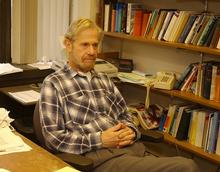
Math professors Simon Kochen (above) and John Conway proved the Free Will Theorem, which suggests an unexpected connection between the nature of human decisions and the behavior of microscopic particles.
Scientists and philosophers have long questioned whether the future of the world is entirely a function of its past. They have wondered whether everything that happens – every wink, idea, smile – is the inevitable end of a sequence of events set in motion by the Big Bang. They have asked whether the motion of every electron in every experiment follows a predetermined path – or whether that motion is left to cosmic chance.
Two Princeton mathematicians have cast new light on the question of whether the behavior of particles in the universe is predetermined. In research that is not yet finalized, they have also posited an unexpected link between the answer to this question and a centuries-old debate over human free will.
The professors, John Conway and Simon Kochen, have proven what they call the Free Will Theorem. It says that given three assumptions, if particles’ behavior is truly predetermined, then people cannot have free will. In other words, if the behavior of a particle is fully determined by its past, so too are all the so-called decisions people believe they are making.